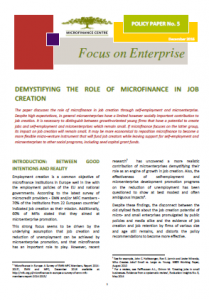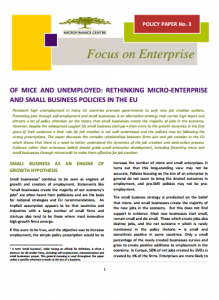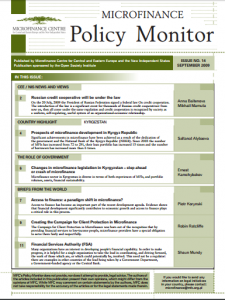Policy Papers 2009-2016
MFC Policy Paper No.5: Demystifying the role of microfinance in job creation
The paper discusses the role of microfinance in job creation through self-employment and microenterprise. Despite high expectations, in general microenterprises have a limited however socially important contribution to job creation. It is necessary to distinguish between growth-oriented young firms that have a potential to create jobs and self-employment and microenterprises which remain small. If microfinance focuses on the latter group, its impact on job creation will remain small. It may be more economical to reposition microfinance to become a more flexible micro-venture instrument that will fund job creators while leaving support for self-employment and microenterprises to other social programs, including seed capital grant funds.
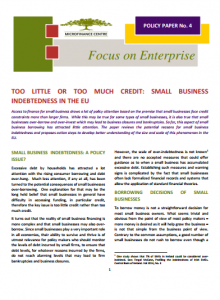
The paper reviews the potential reasons for small business indebtedness and proposes action steps to develop better understanding of the size and scale of this phenomenon in the EU. Access to finance for small businesses draws a lot of policy attention based on the premise that small businesses face credit constraints more than larger firms. While this may be true for some types of small businesses, it is also true that small businesses over-borrow and over-invest which may lead to business closures and bankruptcies. So far this aspect of small business borrowing has attracted little attention.
MFC Policy Paper No. 3: Of Mice and Unemployed: Rethinking Micro-Enterprise and Small Business, 2015
The paper discusses the complex relationships between firms size and job creation in the EU which shows that there is a need to better understand the dynamics of the job creation and destruction process. Promoting jobs through self-employment and small businesses is an alternative strategy that carries high hopes and attracts a lot of policy attention on the theory that small businesses create the majority of jobs in the economy. However, despite the widespread support for small business startups – from entry to the growth dynamics in the first years of their existence – their role for job creation is not well understood and the policies may be following the wrong prescriptions.
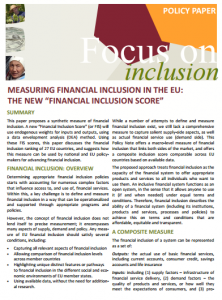
This paper proposes a synthetic measure of financial inclusion. A new “Financial Inclusion Score” (or FIS) uses endogenous weights for inputs and outputs, using a data envelopment analysis (DEA) method. Using these FIS scores, this paper discusses the financial inclusion ranking of 27 EU countries, and suggests how this measure can be used by national and EU policymakers for advancing financial inclusion.
MFC 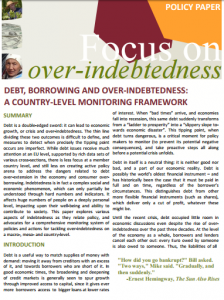
Full text, summary
A review of debt burden and over-indebtedness issues shows that debt is a very complex phenomenon, which has economic impact on growth, and a social impact on the well-being of individuals and households. A lot of research and data is available on the topic offering insights into different aspects of indebtedness. What is missing is a higher level, “big picture” approach to consolidate these various strands of findings and policy initiatives, and provide higher level guidance for policy-makers and advocacy groups. The paper proposes setting up “Debt Watch” mechanism in each country for systematic revision of national policies, actions and gaps in addressing over-indebtedness issues.
MFC Microf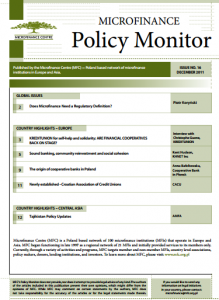
MFC Microfinance Policy Monitor ‘ 2009

